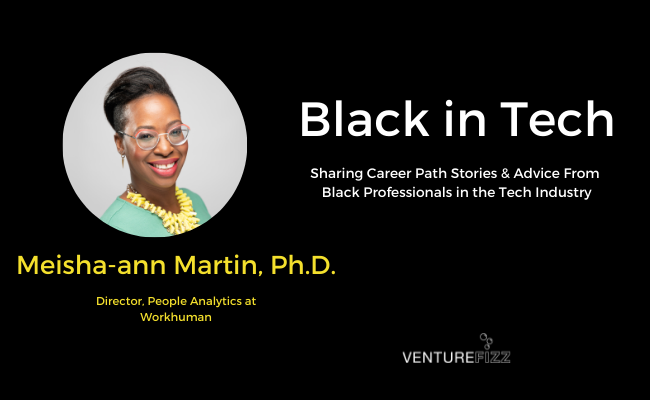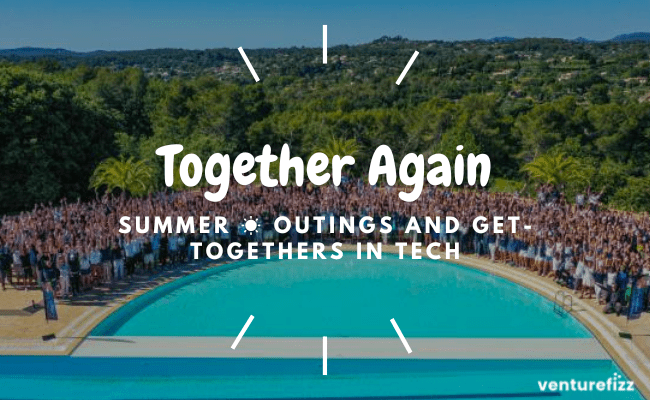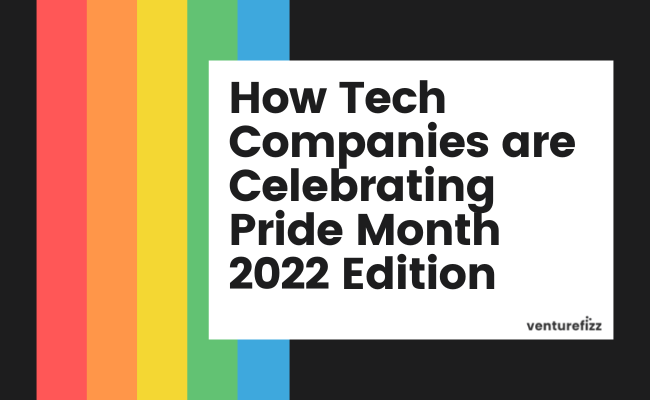Our Black in Tech series features the career path & advice from Black professionals in the tech industry. In this Q&A, Meisha-ann Martin, Ph.D., Director, People Analytics at Workhuman shares her story.
Where did you grow up and what were you like as a child? What did your parents do for work?
I grew up on the lovely island of Jamaica, in a city called Portmore. Most people have never heard of Portmore, but it’s right next door to Kingston, the capital of Jamaica. My mother worked in life insurance and was spectacularly good at it. She provided a great example of how to have a successful career as a woman. I am so fortunate to have grown up with such a powerful female career role model. My father is an accountant. He also has inspired the way I approach my career. He taught me about the importance of balance. He still does accounting, but he also got into the farming business. My father does things in his own way in the way that works best for him, and I greatly admire that.
Where did you go to college? What did you study and what did you do after graduating?
I left Jamaica to attend Morgan State University in Baltimore, Maryland. Morgan State is an HBCU (historically black colleges and universities) and was a soft spot for me to land in the US as I slowly adjusted to my new status as an racial minority. I studied Psychology. From there, I went on to University of South Florida in Tampa, FL where I earned a Masters and Ph.D. in Industrial/Organizational Psychology. In graduate school, I built on the diversity research I started doing while I was an undergrad and both my thesis and dissertation were on diversity-related topics. When I left graduate school, I took a role leading the pre-hire assessment process for a financial services firm. This was the beginning of me incorporating diversity into roles that did not have diversity in the title. I was responsible for selecting, designing and administering pre-hire assessments. In this role, I took the opportunity to advocate for fair hiring practices even beyond the pre-assessment process. That approach worked well, and the role later expanded to include employee engagement and more people analytics, and I approached all of it in a similar way.
What inspired you to get into the tech industry?
I worked for a huge semiconductor company that was very good at incorporating technology into operations and analytics. I was responsible for designing and creating real time dashboards for our People and Resources Department. This required me to lead a project to create integrations between the Human Resources Information System (HRIS) and a data warehouse that then automatically updated our Tableau dashboards. I learned so much and started to understand the importance of data structures and see how people analytics benefited from technologies like data warehouses. This inspired me to get into the tech industry and learn more. My current work in technology has also taught me about how technology can improve the employee experience, particularly for remote or partially remote workers.
What has your career path looked like in tech and the various positions you’ve held before joining Workhuman?
After my work at the semiconductor company, I led a talent management team. That gave me the opportunity to learn about learning management systems and more about setting up talent processes in our HRIS. This was really the beginning of my thinking about how technology impacts how people experience work.
Can you share the high-level responsibilities of your current position as Director, People Analytics at Workhuman?
In this role, I am responsible for leading a strategic research agenda that proves the impact of humanistic work experiences. Since we believe that without the human it’s only work, my team engages individual clients, showing them the impact of our human-centered technology on business outcomes. We also do studies using the millions of data points collected over time and across clients. This allows us to identify emergent patterns in how people are experiencing work. Lastly, we do independent surveys of the workforce on topics like recognition, stress, psychological safety, and timely topics such as hybrid working and return to work. As the leader of the team, I do a lot of communication around our findings to prospects, clients, and others. We want to show the world that humanistic work practices are good for the human and good for businesses.
What has attributed to your success thus far and what types of obstacles have you had to overcome along the way as a Black professional?
One of my uncles tells me that I have been asking “But why?” ever since I was a little girl. I think this natural curiosity has served me well in my analytics roles. Digging deeper helps me find the most meaningful insights. As for obstacles, the biggest thing I faced was dealing with how to present insights on diversity and inclusion as a Black woman. Earlier in my career, I would downplay my identity as a Black woman and worry about coming across as self interested. Now I consider my identity and experiences as a Black woman to be part of my expertise, and now I freely share my story and my experiences in tandem with our research findings. I also use my own experiences and the experiences of those around me to inform our research agenda. That has been working out really well. It’s also helped me facilitate the idea that users of our award-winning peer-to-peer social recognition platform feel psychologically safe; to bring their whole selves to work, take risks and be vulnerable without the fear of negative consequences.
What types of programs and initiatives does Workhuman have that support diversity, equity, and inclusion?
With diversity, equity, and inclusion a core part of our connected global culture at Workhuman, we aim to be the unwavering champion for our people, customers, and partners through our pioneering product vision and our commitment to the diversity that is changing our world, our perspectives, and our future for the better.
In addition to ongoing recognition from our own product, Workhuman Cloud, we have a number of employee resource groups (ERGs) to support our people and to help elevate the discussion and urgency around diversity, equity, and inclusion. These groups – which include DEI, Women & Allies, and Sparkle - help educate their peers and serve as a community of belonging where everyone can share openly about their journey as either a person of color, women, or LBGTQIA or any ally. Our employee resource groups are a place where members and allies can come together to connect, share resources, and celebrate and learn about the many unique backgrounds that represent our humans. This group also sponsors educational opportunities where people across the organization can participate in meaningful discussions from both internal and external speakers. I have been very fortunate to be part of our ERGs and have not only been able to share my story but have learned so much from my colleagues. We often say at Workhuman how we’re on a journey together and being open and vulnerable about what we don’t know is a first step toward learning and growth.
What advice would you give to other Black professionals who are interested in joining the tech industry?
The tech industry is really hot right now. Take the time to figure out what your particular passion is, which roles in tech align with that passion and target those roles specifically. Doing meaningful work that feeds your passion makes life so much better and is more rewarding than just being able to say you work in tech. And of course, read and study what is happening in the industry. It is critical to stay on top of trends, particularly in the tech industry that is always rapidly evolving and changing.
While general awareness of the problem of diversity in the tech industry is a step forward, to make a lasting change, real actions need to be taken. Do you have any ideas or suggestions on what companies or employees can do to step up and make a difference?
There are a couple of specific things I strongly recommend. We all know that access to education is unequal in this country. Examine the educational requirements for all of your roles and ask yourself if those requirements are really necessary. Also, offer a path internally for those who want to go into certain tech roles. With all the online learning available currently, motivated individuals can self study and gain certifications and knowledge that would qualify them for these roles. Advertise these certifications, courses and positions within your company. Maybe there are current employees who would be interested. Secondly, be purposeful about the environment you create and what you are defining as “professional.” Our old antiquated ideas of professionalism are exclusionary and make some people feel like they have to downplay their authentic selves in order to be a part of your organization. Create an environment where all talented people feel welcomed regardless of what they look like or how they choose to dress or style their hair. These two things should create an environment that attracts, grows, and retains diverse talent.






